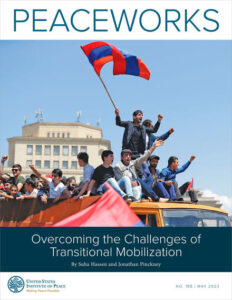 There is an urgent need for the peaceful transformation of autocratic and pseudo-democratic political regimes, say analysts Suha Hassen and Jonathan Pinckney. The vision of a just, peaceful, and rights-respecting international order will never be realized if the moments in which ordinary people use nonviolent action to achieve political breakthroughs do not result in a sustainable democracy, they add, citing Philippe C. Schmitter and Terry Lynn Karl’s classic Journal of Democracy definition of democracy as a political system in which “rulers are held accountable for their actions in the public realm by citizens, acting indirectly through the competition and cooperation of their elected representatives.”
There is an urgent need for the peaceful transformation of autocratic and pseudo-democratic political regimes, say analysts Suha Hassen and Jonathan Pinckney. The vision of a just, peaceful, and rights-respecting international order will never be realized if the moments in which ordinary people use nonviolent action to achieve political breakthroughs do not result in a sustainable democracy, they add, citing Philippe C. Schmitter and Terry Lynn Karl’s classic Journal of Democracy definition of democracy as a political system in which “rulers are held accountable for their actions in the public realm by citizens, acting indirectly through the competition and cooperation of their elected representatives.”
Recent events in Tunisia and Armenia highlight the need for continued vigilance, even when a transition period may be seen as having come to a close. The emergence of a democracy at the end of a transition, such as in Tunisia in 2014, is no guarantee of its long-term permanence, they write for USIP’s Peaceworks:
Yet the patterns of continued mobilization, a range of strategic forms of engagement with government, and dense, interlocking networks of relations among different social movements, CSOs, and political parties can provide some degree of resilience or capacity to react when challenges to democracy arise. These elements are especially pertinent to the transitional period, though they often require a strong foundation in the pre-transitional period and contribute to a robust transitional and post-transitional government.







